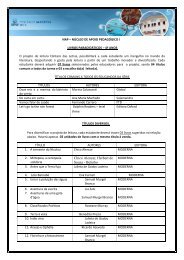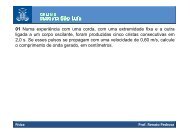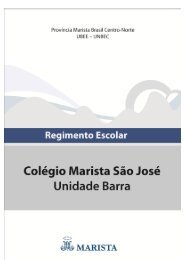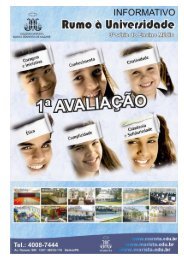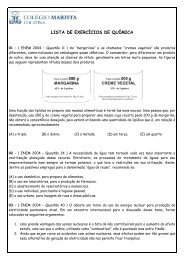Present Perfect Exercises
Present Perfect Exercises
Present Perfect Exercises
You also want an ePaper? Increase the reach of your titles
YUMPU automatically turns print PDFs into web optimized ePapers that Google loves.
Teacher Carol<br />
2 ano
1. Supply the <strong>Present</strong> <strong>Perfect</strong> of the verbs in parentheses:<br />
a) That man ____________________________ has built<br />
another house.<br />
( to build)<br />
have gone<br />
b) We ____________________________ to the country by car.<br />
( to go)<br />
has cooked<br />
c) She ____________________________ our lunch. ( to cook)<br />
d) I ____________________________ have spent<br />
much money. ( to spend)<br />
Have<br />
e) ____________ you ____________________ your bag? ( to lose)<br />
has<br />
lost<br />
told<br />
f) What ______________ she _________________ you? ( to tell)
g) They ____________________________ have written<br />
me a letter. ( to write)<br />
h) We ____________________________ have sent<br />
you a card. ( to send)<br />
i) They ____________________________ have played<br />
soccer. ( to play)<br />
has been<br />
j) Susan ____________________________ sick. ( to be)<br />
has<br />
arrived<br />
k) Karl __________ just ___________________. ( to arrive)<br />
l) I ____________________________ have waited<br />
for you for two hours. ( to<br />
wait)<br />
has attracted<br />
m) He ____________________ me since I was a girl. ( to attract)<br />
n) __________ Have they already ____________ bought their house? ( to buy)<br />
Have<br />
painted<br />
o) ____________ you _____________ your house yet? ( to paint)<br />
p) We _________________________ have been<br />
to the zoo twice. ( to be)<br />
q) The children ____________________________ have slept<br />
yet. ( to sleep)<br />
r) We ___________ have just ___________________Helen. met<br />
( to meet)<br />
s) The boys ___________ have already ________________ brought their books.<br />
( to bring)
SINCE OR FOR?<br />
Since desde ( ponto específico)<br />
For por , há ( tempo decorrido)<br />
for<br />
a) We have lived there ________________ two years.<br />
b) We have lived there _______________ since last year.<br />
c) The bell has rung _________________ for<br />
half an hour.<br />
d) Nobody has written to me _________________ for many weeks.<br />
e) It has rained _________________ since tree o’clock.<br />
f) We haven’t spoken Spanish _________________ since last Christmas.<br />
g) I haven’t eaten any meat _________________ since I was a boy.<br />
h) It has rained _________________ for two hours.<br />
i) I haven’t seen you _________________last Sunday.<br />
since
Supply yet or already:<br />
YET ( ainda não) fim de frases negativas e interrogativas<br />
ALREADY ( já) frases afirmativas / interrogativas<br />
a) I’ve _____________ already done my exercises.<br />
yet<br />
b)She hasn’t answered the question ________________.<br />
c) They’ve _____________ already talked to me.<br />
d) Have you _____________ already invited her?<br />
e) Has she left _____________?<br />
yet<br />
f) We haven’t finished our homework _____________.<br />
yet<br />
g) He has _____________<br />
already<br />
been to New York.<br />
h) We haven’t been to New York _____________.<br />
yet<br />
i) Have they been to India _____________?<br />
yet
5. (PUC – SP) Which is the right alternative?<br />
a) My wife and I have been married for 1 year.<br />
b) My wife and I has been married for 1 year.<br />
c) My wife and I have be married for 1 year.<br />
d) My wife and I has been marrying for 1 year.<br />
e) “a” and “d” are correct.
6. ( UCS-RS) Que alternativa completa corretamente<br />
a frase “ Ever since she was a child she _____________<br />
fish and chips.”<br />
a) have disliked<br />
b) has disliked<br />
c) has been disliked<br />
d) have been disliking<br />
e) have to dislike
6. ( Unimep-SP) Choose the wrong alternative:<br />
a) We haven’t seen each other lately.<br />
b) We have played water polo once.<br />
c) He hasn’t finished his homework yet.<br />
d) They’ve just gone to sleep.<br />
e) Marisa has ever been to Japan?
7. (USJT-SP) What is the wrong sentence?<br />
a) Mariano’s always loved Juliana.<br />
b) I’ve never been to any German city.<br />
c) Tina’s just told me you were here.<br />
d) Where have she been all my life?<br />
e) I’ve already rented us a nice car.
Supply the Simple Past or the <strong>Present</strong> <strong>Perfect</strong> Tense of the verbs<br />
in the parentheses:<br />
a) I ____________________________ have finished<br />
my homework. ( to<br />
finish)<br />
b) When I was a boy, I _________________________ swam<br />
in<br />
the river. ( to swim)<br />
c) She _________________________ met<br />
all her friends last<br />
weekend. ( to meet)<br />
d) He ____________________________ bought<br />
that old car two<br />
years ago. ( to buy)<br />
haven‘t taught<br />
e) We ____________________________ this exercise before.<br />
( to teach)
f) We ____________________________ spent<br />
all our money last<br />
night. ( to spend)<br />
g) John ________________________ came<br />
to the party alone last<br />
night. ( to come)<br />
have brought<br />
h) We ______________________many sandwiches for our<br />
picnic. ( to bring)<br />
have built<br />
i) They _____________________ many new buildings by<br />
the lake. ( to build)<br />
has bought<br />
j) Charles ____________________________ me a nice<br />
present.
Wonder-drug it may be, but aspirin is not suitable for<br />
children under the age of 12. Doctors have warned for<br />
years that if children take aspirin they risk developing a<br />
serious, sometimes fatal condition called Reye’s<br />
syndrome. But despite their warnings, a recent research<br />
project showed that when children under 12 are given<br />
painkillers, one in six has an aspirin.<br />
Parents beware!<br />
Suitable – adequado<br />
To warn – advertir<br />
Developing – desenvolver<br />
despite - apesar<br />
Research – pesquisa<br />
Painkillers - analgésicos
8. A aspirina não é recomendada para crianças com<br />
menos de 12 anos de idade porque:<br />
a) Já está provado que a aspirina detém o desenvolvimento<br />
intelectual das crianças.<br />
b) Elas podem correr o risco de ter seu desenvolvimento<br />
mental interrompido.<br />
c) Já se provou que a aspirina contém substâncias que<br />
prejudicam o desenvolvimento das crianças.<br />
d) Elas se arriscam a contrair uma doença séria, às vezes<br />
fatal.<br />
e) Elas correm o risco de se tornarem dependentes dos<br />
compostos químicos da aspirina.
9. A pesquisa mencionada no texto demonstrou<br />
que:<br />
a) Uma em cada seis crianças toma aspirina, mas muito<br />
raramente.<br />
b) Uma em cada doze crianças toma aspirina, mas<br />
muito raramente.<br />
c) A aspirina é o analgésico mais consumido por<br />
crianças.<br />
d) 60% das crianças com menos de 12 anos tomam<br />
aspirina regularmente.<br />
e) Uma em cada seis crianças toma aspirina.
10. A alternativa que completa corretamente a frase<br />
“ This child __________________ aspirins since he<br />
was 7, has developed Reye’s syndrome and<br />
_____________________ it yet” é:<br />
a) had taken / had overcome<br />
b) has taken / hadn’t overcome<br />
c) has taken / hasn’t overcome<br />
d) hasn’t taking / hasn’t been overcoming<br />
e) have taken / haven’t overcome<br />
overcome superar



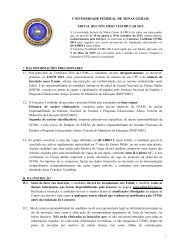
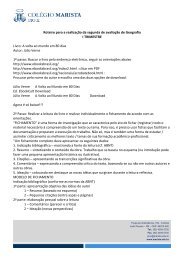
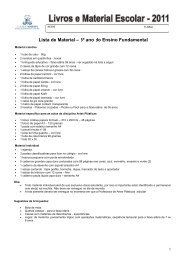
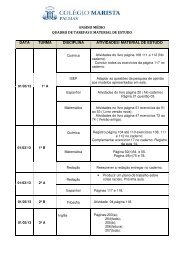
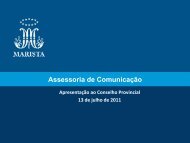
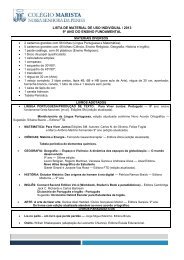
![BIOMAS TERRESTRES DO BRASIL [Modo de Compatibilidade]](https://img.yumpu.com/49932804/1/190x134/biomas-terrestres-do-brasil-modo-de-compatibilidade.jpg?quality=85)
